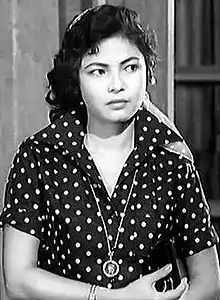Sarinthip Siriwan | |
|---|---|
ศรินทิพย์ ศิริวรรณ | |
 | |
| Born | Phailin Collin (Thai: ไพลิน คอลลิน) 1 January 1926 Nakhon Chai Si, Nakhon Pathom, Thailand |
| Disappeared | 3 December 1987 (aged 61) |
| Status | Missing for 36 years, 1 month and 6 days |
| Occupation | Actress |
| Years active | 1954–1987 |
| Spouse | Chalee Intarawichit (Thai: ชาลี อินทรวิจิตร) |
Sarinthip Siriwan[1] (Thai: ศรินทิพย์ ศิริวรรณ) (born 1 January 1926) is a Thai actress. She made her debut in a leading role in the film Hell Hotel (Thai: โรงแรมนรก) by Rattana Pestonji with Chana Sri-ubon and Surasit Sattayawong. She is a three-time recipient of the Saraswati award (Thai: รางวัลตุ๊กตาทอง). She received two in the Best Supporting Actress category for Free Chinese Movement (Thai: ขบวนเสรีจีน) 1959 and Son of the Northeast (Thai: ลูกอีสาน) 1982,[2] and one in the Best Comedienne category for Unending Fire of Passion (Thai: ไม่สิ้นไร้ไฟสวาท).[2]
Early life
Siriwan's real name is Phailin Collin and she was born in Nakhon chaisri District, Nakhon Pathom in 1926.[3] Her father is Dutch. She graduated from Phadung Darunee school.
Disappearance
Siriwan disappeared on 3 December 1987,[4] while she was filming the movie E chu ku pu pa (Thai: อีจู้กู้ปู่ป้า) by Kamthorn Thapkhanlai. Until now, no trace of her has been found.
See also
Filmography
- 1957 - โรงแรมนรก (Rongraem narok / Hotel Hell)
- 1959 - ขบวนเสรีจีน (Khabuan seri chin / Free Chinese Movement)
- 1977 - แผลเก่า (Phlae kao)
- 1979 - ลูกทาส (Look thas)
- 1980 - บ้านทรายทอง (Ban sai thong)
- 1982 - ลูกอีสาน (Son of the Northeast)
- 1983 - รัตนาวดี (Rattanawadee)
- 1986 - ไม่สิ้นไร้ไฟสวาท (Unending Fire of Passion)
- 1988 - อีจู้กู้ปู่ป่า (E chu ku pu pa)
Drama
- 1961 - Si phaen din (สี่แผ่นดิน)
- 1966 - Leuat Ayuddhaya (เลือดอยุธยา)
- 1979 - Rom chat (ร่มฉัตร)
- 1980 - Rak nan nirandorn (รักนั้นนิรันดร)
- 1982 - Phor krua hua pah (พ่อครัวหัวป่าก์)
- 1985 - Kar long foong (กาหลงฝูง)
- 1987 - Fah tam (ฟ้าต่ำ)
- 1988 - Sa mi ti tra (สามีตีตรา)
References
- ↑ "Sarinthip Siriwan". IMDb. Retrieved 2021-03-17.
- 1 2 หนึ่งเดียว (2006). พิพิธภัณฑ์หนังไทย ฉบับ "ประวัติการณ์ที่สุดหนังไทย". กรุงเทพ: สำนักพิมพ์ป็อปคอร์น. p. 328. ISBN 974-94228-8-0.
- ↑ โรม บุนนาค (2008). แวดวงบันเทิงเมื่อวันวาน สุดยอดเรื่องเด็ดในวงการบันเทิงไทยตั้งแต่ยุคเริ่มหนังไทย. กรุงเทพฯ: สยามบันทึก. p. 232. ISBN 978-974-06-6637-0.
- ↑ "Enforced disappearance victims recalled in the song 'You Know Who'". Prachatai English. Retrieved 2021-03-17.